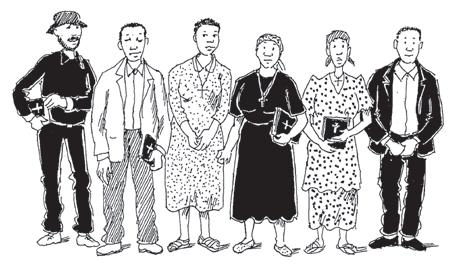
4 minute read
Facilitating discussions on sensitive topics
from Hands in Hand
Sexual violence is a sensitive topic. It is important for the facilitator to create the right environment for people to discuss the issue.
Consider the following tips when facilitating groups:
Advertisement
CREATIVITY When introducing a sensitive topic, think about different ways to present it to the participants: for example, through using a role play, telling a story, showing some pictures to demonstrate a problem or asking groups to discuss particular issues.
SENSITIVITY Some participants may have experienced sexual violence themselves. Allow the opportunity for people to share these experiences if they want to, but do not ask anyone directly about their own background. Do not push people to share if they are not ready.
STORY TELLING Some people may find it easier to talk about their experiences as if it was a story about someone else: for example, encourage them to say ‘my friend was attacked’ rather than ‘I was attacked’. You can suggest that no names are used to enable confidentiality to be maintained. This allows them to talk anonymously about themselves.
REST Ensure there are plenty of breaks and fun activities to relieve any tension from the sensitive discussions.
Creating a ‘safe’ space
It is important to create a space where people feel free to discuss their understanding of sexual violence and talk openly about their experiences. Sexual violence is a traumatic experience and it may take a long time for survivors’ trauma to heal. It may take time to create an environment where survivors feel accepted and listened to. Continue to listen humbly to survivors and include them in all aspects of discussion. Often, survivors will benefit from receiving special support from a trained counsellor. If your church has trained professionals, arrange for separate counselling to be available for survivors, if possible. Ensure you create a ‘safe’ environment for the survivors and protect them in public discussions at all times. We encourage you to read the practical guide on pages 43–49 to help you support someone sharing their experience of sexual violence for the first time.
Guidelines and practical tips
GOOD ENVIRONMENT
NON-JUDGEMENTAL ATTITUDE
LISTEN TO SURVIVORS
BE PATIENT
Focus on creating an environment where all individuals feel confident about being involved in discussions. If some people are not participating, ask them privately if there is anything that can be done to help them participate.
This is vital for survivors to be able to share their experiences, without fearing what people think of them.
Let them know they are being heard. Once they are able to speak about their own experience, survivors can also help care for and support other survivors.
The survivor may feel unable to express themselves for some time after the attack and may only do so when they feel safe and they trust the person listening.
Confidentiality is very important, especially when working with survivors of sexual violence. You must make sure that any personal information is not shared with others outside of the discussion, unless the person gives you permission to do so. Tell your group at the start of the meeting that, in order to keep a safe space, all the information shared during the discussions must not be shared with people outside the group.
NOTE There are circumstances in which you may need to tell a third party about the information you have heard. This is in case someone is in grave danger and the police need to be involved, particularly when this involves a child. See more on pages 45–46.
Mahatma Gandhi

The facilitator’s own awareness and understanding of sexual violence
There are key things that each facilitator needs to be aware of when leading discussions on sexual violence:
A. His/her own attitude to sexual violence
This means the facilitator should be aware of his/her own beliefs and should disclose any myths he/she may have believed, as well as understanding how culture and beliefs have shaped his/her understanding of sexual violence. This is the first and the most important step: being open about one’s own misconceptions and misunderstandings is vital to facilitating impartial discussions and to ensure survivors of sexual violence feel included within these discussions. It also allows the facilitator to experience personal growth and learning.
The self-discovery tool (on pages 50–51) is a tool that enables the facilitator to reflect on and understand his/her personal attitudes and behaviour around issues of sexual violence. It is important to understand that we all have different views of and attitudes to sexual violence. The facilitator may learn from members of the community and be challenged as he/she listens to individuals’ experiences.
B. Group discussions may involve survivors of sexual violence
The facilitator needs to be sensitive in facilitating discussions about sexual violence as some participants may have had painful experiences and may not have received support and treatment to enable healing. It is important to have a trained counsellor at hand or be able to refer survivors to expert care and support.
C. Recent incidents of sexual violence in the media
These events may have been reported in the newspapers, or talked about in the community or on the radio. The way these events have been reported will also affect an individual’s thoughts and beliefs about sexual violence.






